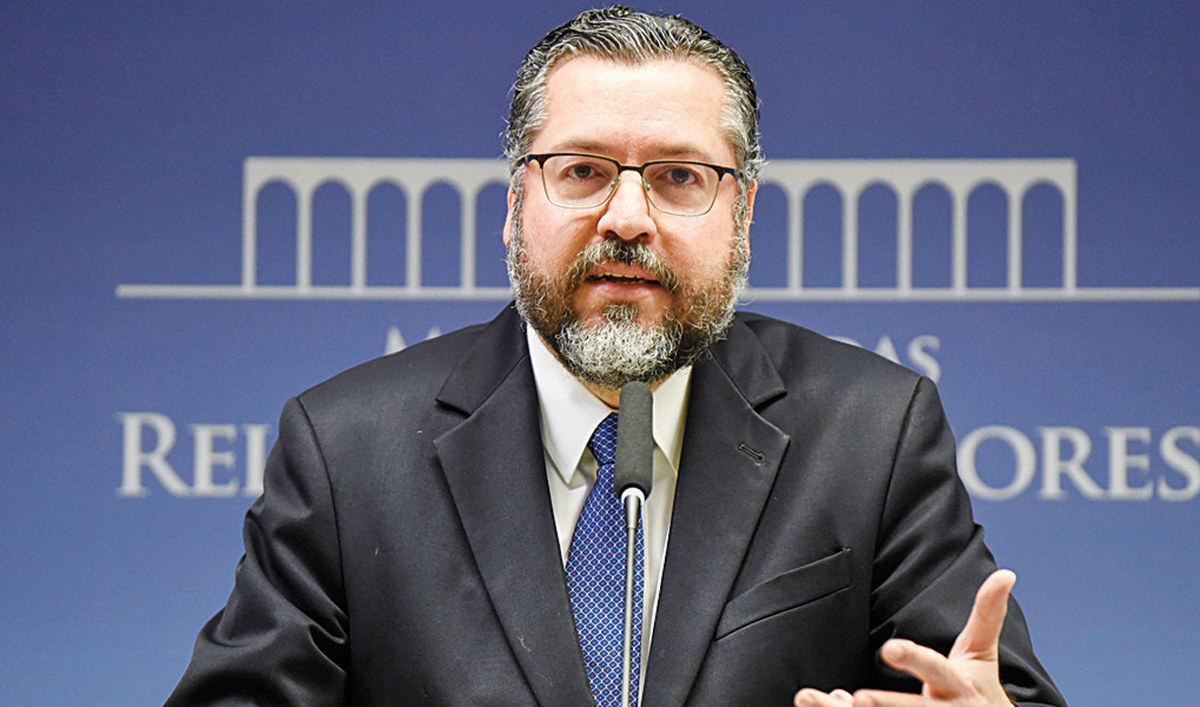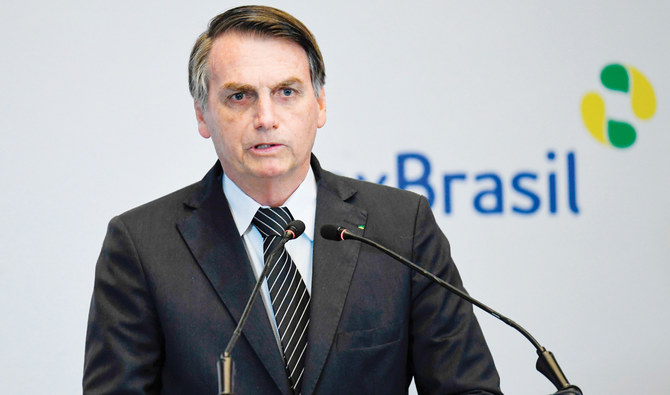RIYADH: President Jair Bolsonaro’s upcoming visit to Saudi Arabia demonstrates Brazil’s interest in strengthening economic cooperation and maintaining high-level relations with one of the world’s leading countries, said Brazilian Foreign Minister Ernesto Araujo.
“The visit will contribute to the expansion of Saudi investments in Brazil, in sectors such as infrastructure, defense, innovation, energy and agribusiness, as well as encourage Saudi participation in Brazilian concessions and privatization programs, in particular in the projects of the Investment Partnership Program (PPI) portfolio,” the minister told Arab News.
The following is the interview:
Q: There have been very cordial bilateral relations between Brazil and Saudi Arabia. Can you shed light on the current level of those relations?
A: Brazil and Saudi Arabia are inescapable partners in both our regions. Last year, we celebrated 50 years of diplomatic relations. Saudi Arabia is Brazil’s largest trading partner in the Middle East: In 2018, the trade flow between our countries reached $4.4 billion (SR16.5 billion).
The perspectives for enhancing mutual investments are encouraging. Last June, President Jair Bolsonaro had a fruitful meeting with Crown Prince Mohammed bin Salman during the G20 Summit in Osaka, where they identified priority areas and joint initiatives aimed at expanding our economic cooperation and partnership in various fields.
Brazilian Minister of Agriculture Tereza Cristina visited Saudi Arabia last September, and the vice president of the Saudi Shoura Council visited Brazil in October. We are definitely witnessing a moment of intensification in our bilateral relations.
Q: Saudi Arabia is undergoing major reforms in line with Vision 2030, Brazil too is witnessing big changes under its new leadership. If you were to summarize the bilateral relations, what would the Brazil-Saudi relationship look like in coming years?
A: Indeed, both Brazil and Saudi Arabia are experiencing major reforms. Our country is undergoing — in the short, medium and long term — an ambitious structural reform agenda that will boost our economy and promote sustainable growth. Of particular note are the pension and tax reforms; the Central Bank independence project (BACEN); and the process of privatization of the economy.
These reforms will create a virtuous process for the economy, generating confidence, making our markets more open to international trade and investment, stimulating competition, productivity and efficiency. I would like to underline that these goals were already indicated by President Bolsonaro in his inaugural speech.
I believe that the convergences between economic reforms in Brazil and the Saudi Vision 2030 development plan, will boost cooperation in a great variety of sectors such as infrastructure, agribusiness, transportation, energy, oil and defense, all of which with great potential for partnerships between the two countries.
Q: With major reforms taking place in line with Saudi Vision 2030, how do you describe your encounters and what aspects of Vision 2030 do you think are the most aspirational?
A: The Vision 2030 plan is the most important project underway in Saudi Arabia, representing a legal framework with rules and guidelines for the restructuring and modernization of the country’s economic and productive system, aiming to make the Kingdom’s economy less dependent on oil.
The economic diversification sought by the plan should also have positive impacts on Saudi society in general, contributing to greater social openness.
I recall that, in 2017, the Council for Economic Affairs and Development (CEDA) approved 12 programs in order to meet the Vision 2030 plan’s objectives and restructure the country’s development process. Brazil is eager to engage with Saudi Arabia in this new endeavor.

Ernesto Araujo, Brazilian foreign minister
In the context of attracting foreign investment based on the Vision 2030 plan, an initiative that has been highlighted is related to the creation of new special economic zones. The King Abdullah Economic City (between Makkah and Madinah, including a seaport), Knowledge Economic City (in Madinah, to consolidate as a technology hub and create 20,000 jobs), Prince Abdul Aziz bin Mousaed economic city project (in Hail, which will act as a ground transportation hub) and Jazan, are the four examples of special economic zones announced so far.
The Vision 2030 plan is the main reference of all mentioned initiatives for the allocation of these resources. Diversification and stability of the economy, financial equilibrium, and improved living standards are essential elements of this process. It is fundamental to galvanize the private sector.
Q: Football is very popular in Saudi Arabia with the national team playing in the World Cup. With Brazil being the most successful World Cup team, is there any collaboration in progress, or plans for Brazilian players to come to the Kingdom and play or Saudi players going to Brazil? Promoting sports in the Kingdom is an important part of Vision 2030.
A: Saudi Arabia’s football has traditionally signed Brazilian coaches, coaching staff and players, both in clubs and in the national squad. World-famous head coaches, such as Mario Zagallo and Carlos Parreira, both world champions with the Brazilian national team, have helped take Saudi football to a higher level.
Currently, Brazil and Saudi Arabia are in the final stages of negotiations of a memorandum of understanding (MoU) on cooperation in sports. The MoU is expected to be signed during the president’s visit. It will have the potential to significantly boost bilateral cooperation between the two nations, both in football and in other sports.
Furthermore, both nations are currently negotiating the participation of Brazilian coaches and coaching staff in the Saudi project of setting up a series of football academies, throughout its territory, to teach the Brazilian style of playing to Saudi kids in ages ranging from six to 11 years. The project aims to popularize the game among Saudi kids and to nurture a new generation of talented players who will bring a lot of joy and pride to Saudi fans.
HIGHLIGHTS
•President Jair Bolsonaro’s visit to Riyadh demonstrates Brazil’s interest in strengthening economic cooperation and maintaining high-level relations with one of the world’s leading countries.
• The Vision 2030 plan represents a legal framework with rules and guidelines for the restructuring and modernization of the country’s economic and productive system, aiming to make the Kingdom’s economy less dependent on oil.
• Brazil and Saudi Arabia are in the final stages of negotiations of a memorandum of understanding on cooperation in sports.
Q: How are trade relations between the two countries, and what is the current level of volume of trade between the two countries?
A: Total trade between Brazil and Saudi Arabia amounted to $4.4 billion in 2018, with a small deficit on the Brazilian side, of about $218.6 million.
In comparison to 2017, Brazil’s oil imports from Saudi Arabia increased in 2018, changing a surplus into a deficit for our country.
In 2018, our exports were mainly of basic products (63 percent), followed by semi-finished goods (19.6 percent) and finished goods (16.9 percent).
The main products exported by Brazil to Saudi Arabia are frozen poultry (38 percent of total value exported) and sugar (16 percent).
As regards imports in 2018, basic products topped the list (71.8 percent of total value imported), followed by finished (26.1 percent) and semi-finished goods (2.12 percent). Crude oil was first among all goods imported (71 percent), followed by fertilizers (12 percent) and polymers (8.5 percent).
Q: Are there some major bilateral agreements planned to be signed during this high-level visit?
A: Yes. Agreements under negotiation for possible signature during the presidential visit include:
(i) Agreement for cooperation in science, technology and innovation
(ii) MoU on short-stay visas
(iii) MoU on cultural cooperation
(iv) Framework agreement for cooperation in defense
(v) MoU between defense ministries on a bilateral defense investment fund
(vi) MoU for cooperation in sports
(vii) MoU between the National Bank for Economic and Social Development (BNDES) and the Saudi Fund for Development on co-financing.
Q: How crucial is this visit in terms of enhancing bilateral cooperation?
A: This is President Bolsonaro’s first official visit to Arab countries in the Middle East. His visit to Riyadh demonstrates Brazil’s interest in strengthening economic cooperation and maintaining high-level relations with one of the world’s leading countries. Cabinet members, congressional and business representatives will join the presidential delegation.
The visit will contribute to the expansion of Saudi investments in Brazil, in sectors such as infrastructure, defense, innovation, energy and agribusiness, as well as encourage Saudi participation in Brazilian concessions and privatization programs, in particular in the projects of the Investment Partnership Program (PPI) portfolio.
The visit will also enable our countries to explore cooperation in the fields of defense, science, technology, innovation and agriculture.




























